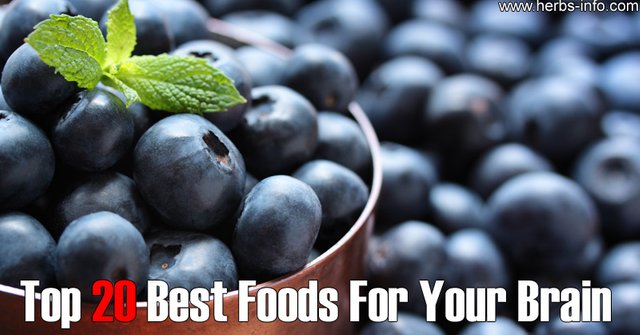Top 20 Best Foods For Your Brain

Can anyone remember the fad for “smart drinks” that was around in the ’90’s? What happened to that? The general idea was that certain substances (typically amino acids, antioxidants or other highly nutritional food derivatives) supported healthy or even enhanced brain function, therefore potentially improving brain performance and making you “smarter”. I liked the concept of this – however I haven’t heard much about it for a while…
The research hasn’t stopped though – and patient scientists, investigating the nutritional qualities of foods, continue to make discoveries. The process of this science is an interesting one, and for the “nutritional truth seeker”, one worth considering.
The most significant scientific findings typically make their way to the public through a multi-stage journey: First, papers are subjected to an approval process known as peer review, before being published in scientific journals. Accepted papers are summarized in a reference form known as an abstract – and we now have wonderful resources such as Pubmed.com which is a gigantic searchable database of medical / nutritional abstracts.
Finally, the various media organizations pick up on these papers and report them to the general public – in a manner which, to be honest, is somewhat haphazard and potentially prone to spin, selective reporting and other forms of “interpretation” – especially after the information has been re-blogged; typically without citation. We are now in a situation where the most sensational news travels the furthest; not necessarily always a good thing – though at least with social media and other forms of free publishing, the vast majority of people have a means by which they can reach the world.
One of the great things about this overall scientific research model that we have, is that research is to a great extent “open source”. This means that the tests and experiments performed can be viewed by others, and, importantly, replicated. One of the lesser-discussed axioms of science is that if an experiment is replicated exactly, with all conditions the same, the results should be identical. Thus, “secret” in-house research is to some extent frowned upon in the medical world. There should not be anything to hide.
One scientific study, performed by one team of researchers, is prone to the possibility of bias, and potential inaccuracy. A result cannot be considered proven if only one experiment has been performed. However, replicate the experiment many times and a pattern will emerge. One can discard the “extremity” results (hopefully noting where their procedures, equipment or other conditions caused the results to skew), and take an average of the rest of the results. Thus it is that by this form of collaborative effort, scientists around the world gradually arrive at what can be considered “facts”. It can be seen that the discovery of truth, when it comes to nutritional and medicinal science, is a slow and patient one. Many of the “heroes” of this field work without significant recognition.
It is also worth considering that another form of bias may have arisen because “facts”, in medicine, are not able to be gained cheaply. It is very expensive and laborious to arrive at a place where a medical claim can be considered scientifically proven. This is worth bearing in mind: In the arena of herbalism, medical claims are very often “unofficial” – despite the thousands of years of human use.
Read more here: http://www.herbs-info.com/blog/top-20-best-foods-for-your-brain/?c=d
nice, i love fruits!
Win Free SBD here!
thanks, me too :)